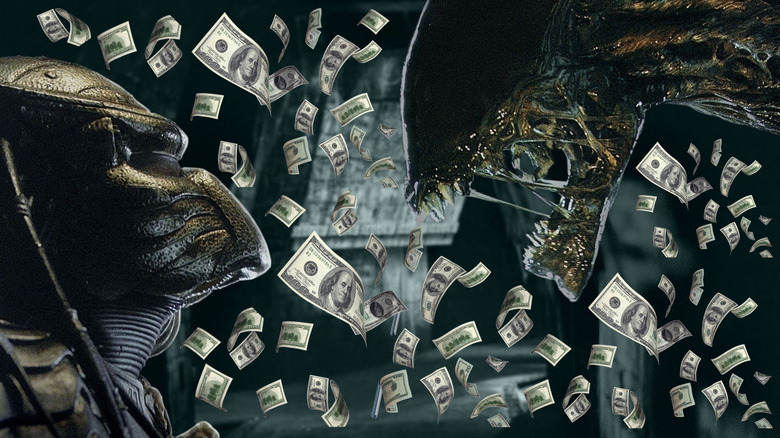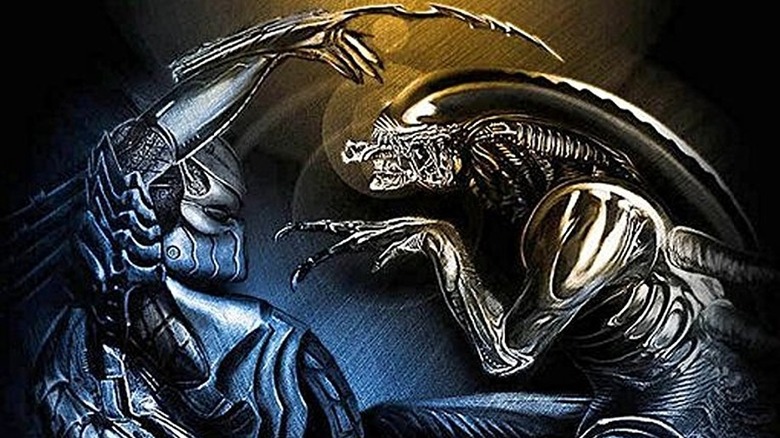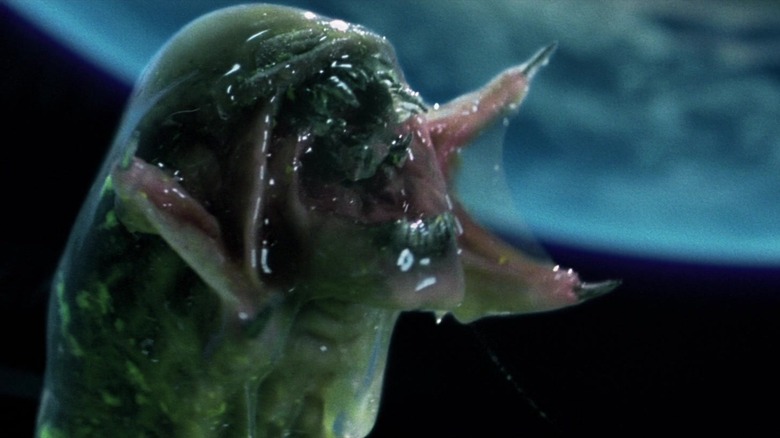Alien Vs. Predator Was A Minor Box Office Hit That Came At A Major Cost
(Welcome to Tales from the Box Office, our column that examines box office miracles, disasters, and everything in between, as well as what we can learn from them.)
"I got pretty upset. I said, 'You do that you're going to kill the validity of the franchise in my mind,'" James Cameron told Ain't It Cool News in 2006, explaining his feelings regarding "Alien vs. Predator." The crossover project had been languishing in development hell for literally decades and Cameron, the director of 1986's "Aliens," clearly didn't believe that bringing these two beloved franchises together was the right move. Whether or not he was correct remains a source of debate. Either way, Fox eventually got things together, releasing "Alien vs. Predator" in theaters in 2004. In doing so, the studio set both properties on a rocky path that has arguably only recently stabilized in recent years.
At the time that he made those comments, Cameron had been speaking with "Alien" director Ridley Scott about a fifth film in the franchise following the release of "Alien: Resurrection" (which was a modest hit but a critical misfire). The two hadn't truly worked together on "Alien" or "Aliens," so having them come together in a meaningful way would have been something special. Scott would instead go on to direct the prequel "Prometheus" in 2012, which remains divisive as ever. Unfortunately, his collaboration with Cameron never came to pass and Fox went with a crossover that feels very much like it was cut from the same cloth as "Freddy vs. Jason" from a few years before it, for better or worse.
In this week's Tales from the Box Office, we're looking back at "Alien vs. Predator" in honor of its 20th anniversary. We'll go over how the film is rooted in the "Alien vs. Predator" comic books, why it took so long for the movie to get made, what happened when it hit theaters, what happened to both of these franchises after the fact, and what lessons we can learn from it all with the benefit of hindsight. Let's dig in, shall we?
The movie: AVP: Alien vs. Predator
"Alien vs. Predator" sees a team of explorers investigating a strange structure underneath the surface of Antarctica, only to end up caught between rampaging aliens and the ruthless predators who "seeded" them for a coming of age ritual in an ancient high-tech pyramid that's also beneath the surface. Paul W.S. Anderson, who turned the "Resident Evil" games into a very successful cinematic enterprise, wound up in the director's chair. Before him though, there were numerous failed attempts to get the crossover off the ground.
It all goes back to the late '80s/early '90s when Dark Horse published the original "Alien vs. Predator" comics, which remain beloved to this day. Peter Briggs ("Hellboy") wrote a script for a proposed "AvP" crossover in 1991, which was largely based on the comics. It was pitched to Fox since the studio controlled both franchises. Fox decided instead to pursue "Resurrection" while the "Predator" franchise remained dormant after "Predator 2." For what it's worth, Brigg's script ended up inspiring the popular "Alien vs. Predator" video games.
Ultimately, producer John Davis was rejecting ideas based on anything pre-existing in favor of an original story. Further drafts by other writers, including "The Purge" creator James DeMonaco, were rejected over the ensuing years. Eventually, Anderson came long with an idea set on present-day Earth, which got the ball rolling. While Anderson is credited with the screenplay alongside "Alien" scribes Dan O'Bannon and Ronald Shusett, Shane Salerno ("Armageddon") actually did a lot of heavy lifting.
In a 2004 interview with UnderGroundOnline, Salerno explained that he wrote the shooting script, revisions for the cast, and even traveled to Prague to do on set work, along with additional work in Los Angeles after the fact. After years of being stuck in development hell, Anderson's idea, with Salerno's help, managed to get this train moving. Whether or not it was moving in the right direction is another question entirely.
Carving a new path for Alien and Predator
In that same '04 interview, Salerno leaned into the idea that he and his fellow creatives were doing something original with "Alien vs. Predator," pushing against internet rumors and leaked scripts for previous versions that were being widely discussed online:
"We're working from a brand new story that is set on Earth in the present day. It's not what people expect and it's not aliens and predators fighting in a boxing ring. There is so much misinformation about this film on the Internet. One popular web site reviewed a draft of the script from a decade ago that they said was our shooting script. Paul and I had never seen it and certainly didn't write it."
One thing about the story of "Alien vs. Predator" is that it tries to establish that both of these alien races have been around for millennia. Granted, neither this film or its sequel (which we'll talk about more in a bit) are considered part of the official canon, but it's not as though that was included in the pitch to moviegoers at the time. Setting it on Earth circa 2004 came with major implications, which Scott eventually abandoned while making "Prometheus" its equally divisive 2017 sequel "Alien: Covenant."
In stark contrast, we now live in a world where Fede Álvarez worked closely with Scott and Cameron while making "Alien: Romulus" to help maintain the continuity. Neither Fox nor Anderson, on the other hand, seemed to care all that much about what Cameron or Scott thought at the time. They just wanted to see these two genre icons duke it out and they felt this was the best way to go about it.
The filmmakers did connect some dots though, like bringing "Aliens" actor Lance Henriksen back to play Charles Bishop Weyland — who was meant to be the man behind the Weyland-Yutani Corporation, and whom the android Bishop was clearly modeled after. The rest of the cast was filled out largely with character actors, led by Sanaa Lathan ("Love & Basketball") as the film's final girl.
The financial journey
Anderson managed to bring the effects-heavy film in for a budget in the $60 million range. He also included lots of practical creature effects, leaning on those as much as he could. Both the Xenomorphs and the Predators were highlighted heavily in the marketing, making it clear that audiences were getting a major showdown. The trailers and posters also boasted the solid tagline, "Whoever wins...we lose."
Fortunately for Fox, the competition wasn't particularly fierce when "Alien vs. Predator" (often styled as "AVP: Alien vs. Predator") hit theaters on August 13, 2004. Even against what could at best be described as mixed reviews, the film topped the box office on opening weekend with $38.2 million, surpassing fellow newcomers "The Princess Diaries 2" ($22.9 million) and "Yu-Gi-Oh!: The Movie — Pyramid of Light" ($9.4 million). At the time, that was a record for both the "Alien" and "Predator" franchises, not accounting for inflation.
The only downside is that "AvP" dropped like a rock in its second weekend, taking a 67% dive for a $12.4 million haul. "Exorcist: The Beginning" and "Without a Paddle" opened over that same frame, while Lionsgate's surprise hit shark movie "Open Water" expanded into wide release. In the end, the front-loaded nature of the crossover's performance didn't impact the final narrative all that much. When push came to shove, Fox wound up with a hit.
"Alien vs. Predator" finished its run with $80.2 million domestically to go with $97.1 million internationally for a grand total of $177.4 million worldwide. That remains a record for the "Predator" franchise to this day. It was also more than enough to justify a sequel. That would come in the form of 2007's infamous so-dark-it's-hard-to-see-things "Alien vs. Predator: Requiem," which was made on a smaller budget and pulled in $130.2 million globally, despite being the worst-reviewed entry in either of these franchises.
The Alien and Predator franchises got messy after AvP
Two decent hits. Two movies that were met with what could best described as a "meh" from general audiences, if one were to average it all out. Even so, money talks, and that's probably why there was talk of "Alien vs. Predator 3" well into 2008. That never came to pass. Instead, Scott made "Prometheus" and Fox took the "Predator" series in another direction with 2010's "Predators," which was a solid hit, and one that has developed something of a devoted audience in the years since its release.
Be that as it may, both of these franchises have wandered somewhat aimlessly in the years since this crossover. "Prometheus" was a pretty big hit theatrically, albeit one that was incredibly divisive, with Scott even admitting on some level that he missed the mark with it. While he tried to course correct in some ways with "Covenant," the film was a commercial misfire that killed the franchise until Alvarez came along to make "Romulus." During the years in-between, we also had Neill Blomkamp's proposed "Alien 5," which never came to pass.
As for "Predator," the franchise was dormant until Shane Black's "The Predator" was released in 2018. That movie was infamously plagued with a troubled production featuring lots of reshoots on its way to being met with what could generously be described as a mixed response. That once again killed the franchise until Dan Trachtenberg revived it impressively with 2022's "Prey." The only downside is that the praised prequel went directly to Hulu, rather than getting its day in theaters.
All of that's to say: It's only been in recent years that both of these respective franchises have managed to find a true footing again. The last two decades have been a real mixed bag for both of them and, in some ways, that all goes back to "AvP." Was this crossover worth it? Did this middling hit come at a much larger cost in the end?
The lessons contained within
When Fox decided to make "Alien vs. Predator," it was mortgaging the immediate future of both franchises. Even the most avid defenders of the movie would be hard-pressed to say it rises to the level of either "Alien" or "Predator," both all time classics of the genre. Once "Requiem" fell even further below that standard, it was back to the drawing board, leading to divisive prequels and underwhelming sequels over the course of the next decade and change.
What's perhaps most frustrating about all is that "Alien vs. Predator" is a concept with huge potential. Many fans adore those stories from the comic books, and Briggs' original script could have captured that a bit more faithfully. Instead, Fox decided that comics weren't good source material and waited more than a decade to do a watered-down version of the premise. Fox knows there is still gas in the tank too, as an "Alien vs. Predator" anime series was made but ultimately shelved following the Disney merger. This franchise does feel cursed in some ways.
What could we have had instead? Again, Cameron revealed in that 2006 interview that "Ridley and I talked about doing another 'Alien' film." They could have, in some way, collaborated on a version of "Alien 5." What might that have looked like? What would the franchise look like now if that had happened? We'll never know, but one has to imagine that whatever the result, it would have been more compelling than what we got in 2004. Then again, Cameron himself doesn't exactly hate "AvP."
"I saw 'Alien vs. Predator' and it was actually pretty good," the filmmaker said in that same '06 interview. "I think of the five 'Alien' films, I'd rate it third." That's saying a lot coming from the guy who made "Aliens." At the very least, the future is bright. "Romulus" is doing well in the early going and Trachtenberg is coming back for another "Predator" movie titled "Badlands." Things eventually worked themselves out. Still, looking back, it's hard not to wonder what might have been.




